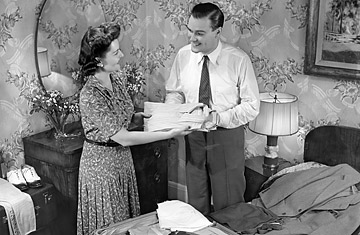
(2 of 2)
In other words, it's not that men make more than women because they work longer hours, are more highly educated or simply take higher paying jobs. Rather, the new findings suggest the wage gap may be largely attributable to gender-role attitudes. And the big winners, it seems, is men with traditional views. Why the gap persists, Judge and Livingston aren't sure, but Judge thinks it might be have something to do with the different ways men and women sign onto new jobs. Women on the whole are less effective at negotiating salaries than men, and they tend to be less aggressive about asking for bigger salaries, or they accept employers' offers without negotiating at all. And Judge suspects that tradition-bound women may be even worse at it than their more egalitarian counterparts: "I would posit that egalitarian women are not as susceptible to settling for less in the negotiating process," he says.
As for those money-making traditionally minded men, Judge theorizes that if they believe they are the family's primary breadwinner, they may show greater dedication to career and are perhaps more aggressive than other men in terms of salary negotiation. Compared with men with egalitarian attitudes, the primary breadwinner simply has more at stake. "Maybe the egalitarian guy thinks, 'Well, I don't have to go the extra mile because my wife and I share earning responsibilities equally,'" Judge says.
Another factor could be bias on the part of the employer. "We're learning that more and more aspects of organizational psychology are operating somewhat subconsciously," says Judge. "It may be that employers are more likely to take advantage of traditional gender-role women." We can learn a lot about someone based on a very short acquaintance; perhaps employers make judgments about a prospective employee's gender attitudes, on the basis of things like a more conservative style of dress or hairstyle and demure mannerisms, Judge says. "I wouldn't be surprised," he says, "if employers are treating these women differently." Employers perhaps should be aware of this subconscious effect and make more of an effort to be fair. "Most employers," says Judge, who studies gender differences in negotiating skills, "wouldn't be happy to see a big salary differential between men and women in the workplace."
The bottom line is that "psychology and people's attitudes toward their roles in life matters in an earnings gap, just as economics do," says Judge. But his sample of middle-aged men and women were employees of a more universally old-fashioned workplace; Judge thinks there's hope for future generations of workers: "The gap is narrowing," he says. "Older people do have more traditional views but each year the [attitude] gap between those that hold traditional views, and those that believe men and women are equal is narrowing. One would be hopeful that for new entrants into the workforce, this won't be as much an effect."
